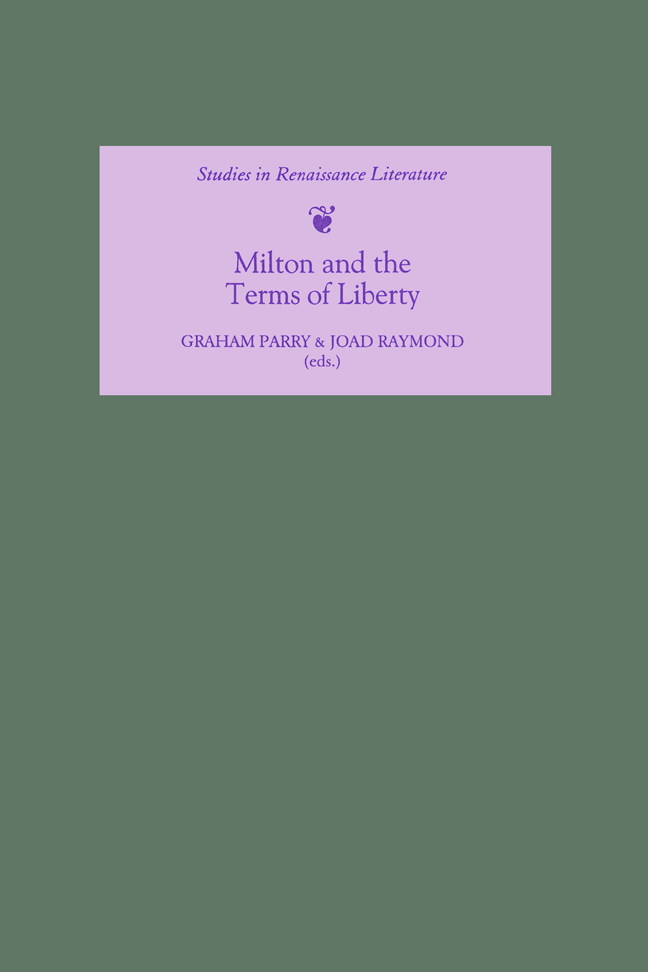Book contents
- Frontmatter
- Contents
- Contributors
- Acknowledgements
- Introduction
- 1 John Milton and the Politics of Slavery
- 2 Milton before ‘Lycidas'
- 3 Prosody and Liberty in Milton and Marvell
- 4 'In These Western Parts of the Empire': Milton and Roman Law
- 5 The King is a Thing
- 6 'in time of Warre … our Language is all corrupt with military Tearms': The Politics of Martial Metaphors in Post-regicide England
- 7 Alexander More Reads Milton: Self-representation and Anxiety in Milton's Defences
- 8 Stylometry and the Provenance of De doctrina christiana
- 9 The Figure and the Ground: Samson as a Hero of London Nonconformity, 1662-1667
- 10 The Publication of the King's Privacy: Paradise Regained and Of True Religion in Restoration England
- 11 'To try, and teach the erring Soul': Milton's Last Seven Years
- 12 Pandemonic Panoramas: Surveying Milton's ‘vain empires’ in the Long Eighteenth Century
- Index
- Studies in Renaissance Literature
7 - Alexander More Reads Milton: Self-representation and Anxiety in Milton's Defences
Published online by Cambridge University Press: 15 February 2024
- Frontmatter
- Contents
- Contributors
- Acknowledgements
- Introduction
- 1 John Milton and the Politics of Slavery
- 2 Milton before ‘Lycidas'
- 3 Prosody and Liberty in Milton and Marvell
- 4 'In These Western Parts of the Empire': Milton and Roman Law
- 5 The King is a Thing
- 6 'in time of Warre … our Language is all corrupt with military Tearms': The Politics of Martial Metaphors in Post-regicide England
- 7 Alexander More Reads Milton: Self-representation and Anxiety in Milton's Defences
- 8 Stylometry and the Provenance of De doctrina christiana
- 9 The Figure and the Ground: Samson as a Hero of London Nonconformity, 1662-1667
- 10 The Publication of the King's Privacy: Paradise Regained and Of True Religion in Restoration England
- 11 'To try, and teach the erring Soul': Milton's Last Seven Years
- 12 Pandemonic Panoramas: Surveying Milton's ‘vain empires’ in the Long Eighteenth Century
- Index
- Studies in Renaissance Literature
Summary
He who would not be frustrate of his hope to write well hereafter in laudable things,ought him selfe to bee a true Poem,that is,a composition, and patterne of the best and honourablest things; not presuming to sing high praises of heroick men, or famous Cities, unlesse he have in himselfe the experience and the practice of all that which is praise-worthy.
THE familiarity of this passage from An Apology for Smectymnuus can obscure its sense and its astonishing if characteristically Miltonic bravado. Milton does not merely invoke the ethical proof, he blurs the line between writer and text, between author and subject. David Loewenstein remarks that the statement ‘is not quite the same thing as asserting that the good poet or rhetor must be a good man: rather … he must himself be nothing less than a good poem, a self transformed into a work of art'. Milton breaks here with Spenser, the ‘better teacher’ of Areopagitica (2: 516), who describes the hero of The Faerie Queene as ‘the image of a brave knight, perfected in the twelue priuate morall vertues'. Philip Sidney, echoing Aristotle's Poetics, asserts what Spenser implies, that it is fictionality that allows a literary character to be a pattern of virtue. While the historian is restricted to ‘what men have done', the poet – or ‘maker’ of fictions – is able ‘not only to make a Cyrus, which had been but a particular excellency, as nature might have done, but to bestow a Cyrus upon the world, to make many Cyruses, if they will learn aright why and how the maker made them'. In his insistence that the living poet can himself embody the ideal formerly embodied by the epic hero, Milton parts company with Sidney and Spenser. The praise of ‘heroick men’ is the task of epic, but now epic is directed inward, for the ‘experience and practice of all that which is praise- worthy’ must be found in the poet himself.
This principle, articulated in 1642, informs the heroic prose of the early 1650s. It is hardly surprising that the character of the author should be central to the Defences and not merely to their autobiographical digressions, given that Milton compares his role as defender to that of national epic poet (Defensio secunda,4: 685).
- Type
- Chapter
- Information
- Milton and the Terms of Liberty , pp. 111 - 124Publisher: Boydell & BrewerPrint publication year: 2002



